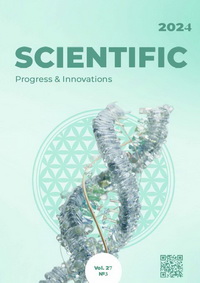Evaluation of the effect of foliar fertilization with Plantafol on the productivity of tomato hybrids (Solánum lycopérsicum L.)
DOI:
https://doi.org/10.31210/spi2024.27.03.04Keywords:
tomato (Solánum lycopericum L.), hybrids, chelate complexes, microfertilizers, cultivation technology, foliar feeding, yieldAbstract
A study was conducted to determine the effect of foliar feeding with Plantafol on the growth and development of F1 tomato hybrids plants of different ripening periods throughout the growing season and the overall yield. The aim of our research was to determine the effect of foliar feeding with Plantafol (manufactured by Valagro, Italy) on the growth and development of plants throughout the growing season and the overall yield of tomato hybrids. In the experiment conducted in 2018–2021 in film greenhouses at the experimental site of the State Biotechnology University in the south-eastern part of the Left-Bank Forest-Steppe of Ukraine, the following options for fertilizing with Plantafol were studied in the fruiting phase using F1 tomato hybrids Berberana (early) and Bostina (medium). It was found that foliar feeding accelerated the development phases of plants compared to the control without treatment. The development of plants treated with Plantafol was most intense in the budding phase, with buds forming on the plant two to four days earlier than in the control. The biometric indicators in the mass flowering phase were higher in plants that received foliar feeding with Plantafol. Depending on the foliar feeding used, during the mass flowering period, a difference of 3 to 18 % was determined in the main biometric indicators of tomato plants. During the fruiting phase Fertilizing with Plantafol showed the best plant development in the experiment with three plant treatments. The formation of the total tomato yield by months of the fruiting period in the experiment with three plant treatments was maximum, with the yield level indicator for both hybrids being 12–21 % higher than the control. According to the research results, the best was the experiment with three treatments, which resulted in an increase in yield for the Berberana hybrid by 17.5 % (by 2.8 kg/m2) compared to the control and for the Bostina hybrid by 14.8 % (by 2.2 kg/m2) compared to the control. The prospects for further research are to establish the relationship between the composition of chelated micronutrient fertilizers with various chelating agents and the impact on the processes of yield formation from the application of such fertilizers by foliar feeding methods and the selection of the optimal fertilizer composition for further use, due to which producers will be able to receive additional profit.
Downloads
Published
How to Cite
Issue
Section
License
Copyright (c) 2024 Scientific Progress & Innovations

This work is licensed under a Creative Commons Attribution 4.0 International License.

 Creative Commons Attribution 4.0 International Licens
Creative Commons Attribution 4.0 International Licens